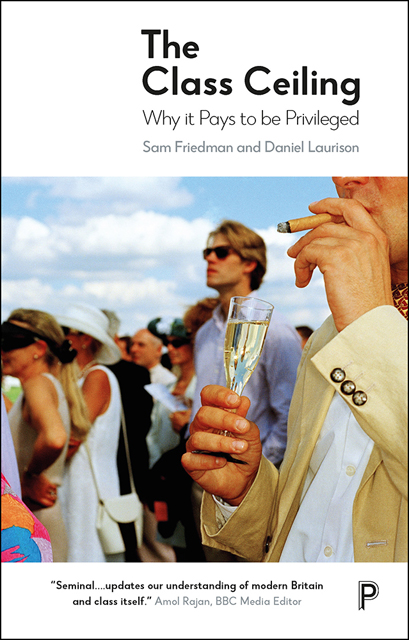Book contents
- Frontmatter
- Dedication
- Miscellaneous Frontmatter
- Contents
- List of figures and tables
- Acknowledgements
- Note on language usage
- Introduction
- one Getting in
- two Getting on
- three Untangling the class pay gap
- four Inside elite firms
- five The Bank of Mum and Dad
- six A helping hand
- seven Fitting in
- eight View from the top
- nine Self-elimination
- ten Class ceilings: A new approach to social mobility
- eleven Conclusion
- Epilogue: 10 ways to break the class ceiling
- Methodological appendix
- Notes
- References
- Index
four - Inside elite firms
Published online by Cambridge University Press: 14 April 2023
- Frontmatter
- Dedication
- Miscellaneous Frontmatter
- Contents
- List of figures and tables
- Acknowledgements
- Note on language usage
- Introduction
- one Getting in
- two Getting on
- three Untangling the class pay gap
- four Inside elite firms
- five The Bank of Mum and Dad
- six A helping hand
- seven Fitting in
- eight View from the top
- nine Self-elimination
- ten Class ceilings: A new approach to social mobility
- eleven Conclusion
- Epilogue: 10 ways to break the class ceiling
- Methodological appendix
- Notes
- References
- Index
Summary
“Hear that?” asks Dave, a senior manager at 6TV, as he leads us through the offices of the television broadcaster, on the way to our interview room. The layout of each department, we observe as we walk, is exactly the same. There is no spatial demarcation of grade or seniority, and the desks are arranged open-plan around a line of brightly coloured ‘break-out’ rooms in the centre of each floor. This gives both the impression of inclusivity and also, as we’ve just put it to Dave, means that it must be quite hard to remember which department you are in. He smiles knowingly. “Hear that?” he repeats, this time cupping his hand over his ear to listen on the third floor: “You just have to listen to know which floor you’re in. You can tell by the accents. Posh, right? Yep, this is Commissioning.”
So far in this book we have shown that those from privileged backgrounds not only enter organisations like 6TV at disproportionately high rates, but they also tend to earn significantly more once they get there. More worryingly, and as we explored in the previous chapter, this class pay gap persists even when we take into account an extensive battery of ‘meritocratic’ factors.
Yet a pay gap like this can imply two quite different issues. It might mean, for example, that those from working-class backgrounds are getting paid less for doing the same work (that is, for doing jobs at the same level, same company and same department). Equally, however, it may also reflect the kind of workplace segregation implied by Dave’s comment – that is, those from working-class backgrounds may be paid less on average because they are less likely to enter the most prestigious (and high-paying) departments, like Commissioning at 6TV. Moreover, and perhaps even more significantly, this segregation may also be vertical; it may be that even when those from a working-class background enter the most prestigious areas within the most prestigious firms, they still struggle to reach the top.
Adjudicating between these accounts means going beyond national survey data. Much as a large data set such as the Labour Force Survey (LFS) represents a powerful analytical tool, it also has important limitations. In particular, it lacks the granularity necessary to see such patterns of segregation within firms.
- Type
- Chapter
- Information
- The Class CeilingWhy It Pays to Be Privileged, pp. 71 - 86Publisher: Bristol University PressPrint publication year: 2019



